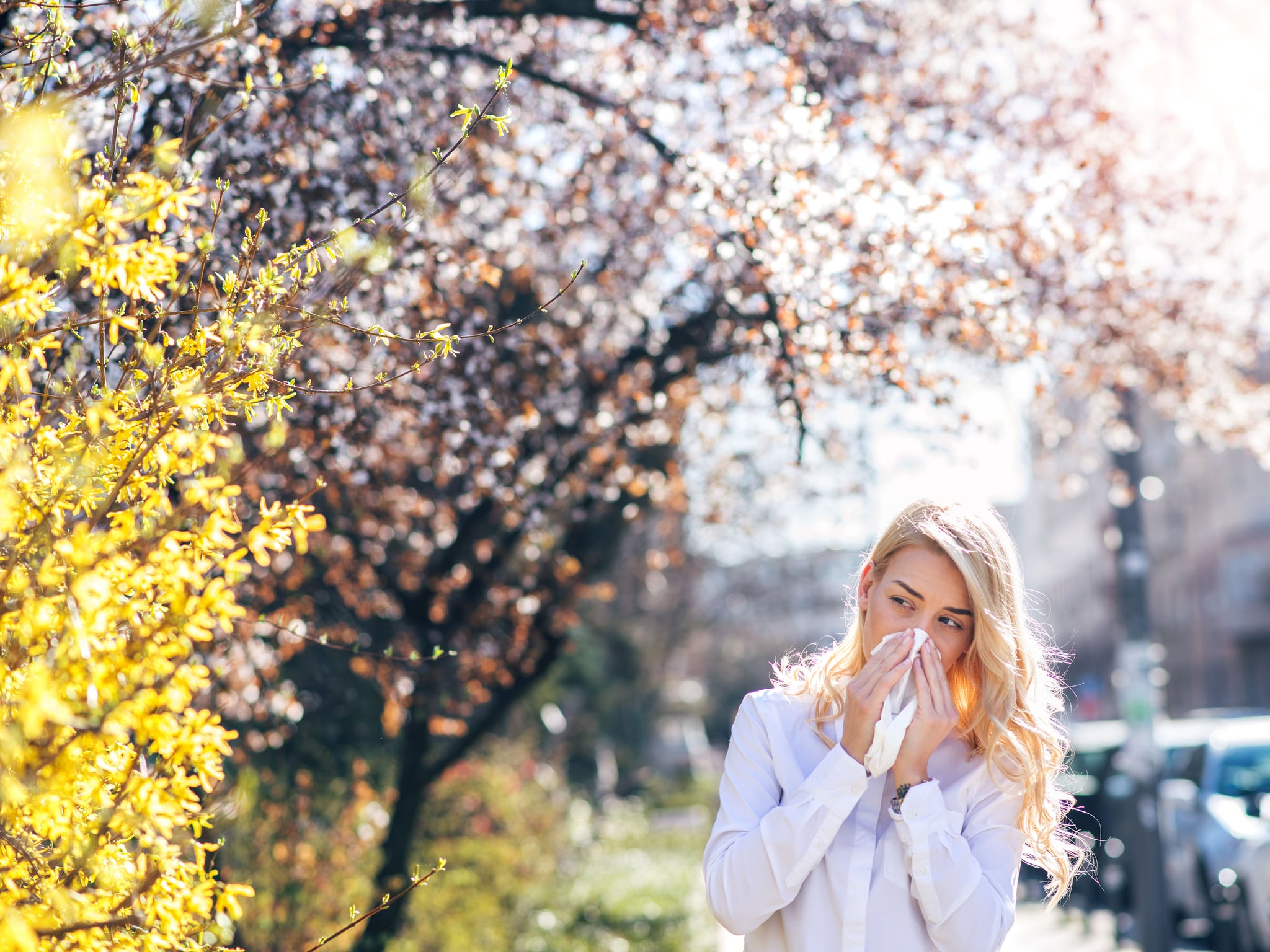Products You May Like

With warmer weather blowing in (finally!) comes blooming flowers and pollen, grasses, and trees. We love these signs of spring, but unfortunately, many people are left dealing with spring allergies. Get out the tissues for all the sneezing, runny noses, and itchy eyes. But wait — with COVD cases still popping up, how can you tell if your symptoms are caused by allergies or COVID?
Like colds and the flu, seasonal allergy symptoms can be very similar to COVID symptoms. Here, board-certified pediatric and adult allergist Katie Marks-Cogan, MD, cofounder and chief allergist for Ready, Set, Food! (an early food allergen introduction program for babies), explains how to tell if your symptoms are typical for allergies, or if you’re dealing with a potential case of COVID.
What Are the Symptoms of COVID-19?
If someone is exposed to the coronavirus and contracts it, the most common symptoms, according to the Centers for Disease Control and Prevention (CDC), include fever, dry cough, and difficulty breathing, Dr. Marks-Cogan says. The fever is typically over 100.5°F, specifies Purvi Parikh, MD, allergist with the Allergy and Asthma Network.
Other symptoms of COVID include fatigue, body aches, pressure in the chest, headache, sore throat, congestion, or a runny nose. Digestive issues such as nausea, vomiting, or diarrhea can also occur, as can loss of appetite. A new loss of taste or smell has also been associated with COVID-19. These symptoms usually occur two to 14 days after exposure to the virus, and in mild cases, last for 10 to 14 days.
In more severe cases, the virus can move into the lungs, causing pneumonia, Dr. Marks-Cogan says. This means the lungs fill with pockets of pus or fluid, with symptoms like severe shortness of breath and painful coughs that can last two to three weeks. (Though it can last six to eight weeks or longer for older adults or those with chronic diseases or other health problems.)
What Are the Symptoms of Seasonal Allergies?
Sneezing and itchy or watery eyes are very common symptoms in people with seasonal allergies, Dr. Marks-Cogan explains, who also adds that “they are rare symptoms in adults with COVID-19.” She also warned that allergic asthma can often flare during this time of year due to higher pollen counts, which can cause wheezing, cough, and shortness of breath.
People can experience seasonal allergy symptoms for weeks or months, Dr. Marks-Cogan says, depending on which allergens trigger their symptoms. Seasonal allergy symptoms can worsen on days with higher pollen counts, such as on dry, windy days, or right after thunderstorms, she explains.
What Symptoms Do Seasonal Allergies and COVID-19 Share?
Fatigue can be seen in both seasonal allergies and COVID-19, as well as headaches, wheezing, dry cough, sneezing, running or stuffy nose, and loss of smell. Both allergies and COVID can occasionally cause conjunctivitis, aka pink eye, according to the Mayo Clinic. This can appear as red or pink eyes with swelling, itching or irritation, extra tear production, or discharge, according to the CDC. Meanwhile, a fever, diarrhea, muscles aches, and abdominal pain are not symptoms of allergies, explains Dr. Parikh.
How to Tell If It’s Seasonal Allergies or COVID-19
If you have similar symptoms at the same time every year and your symptoms are mostly sneezing, runny nose, and itchy or watery eyes, then you’re much more likely to be suffering from allergies than COVID, explains Dr. Marks-Cogan. If these symptoms improve with an oral antihistamine (like Zyrtec, Allegra, or Claritin) or asthma medication, then they’re more likely due to seasonal allergies. Although seasonal allergies can develop later in life or when you visit a new place with new allergens, if you’ve never had symptoms like this before, it’s best to get tested for COVID just to be sure.
“Some people with severe nasal allergies can sometimes experience a decreased sense of smell. However, this usually occurs after long-standing nasal congestion is present or is due to nasal polyps which can be seen in people with seasonal allergies,” Dr. Marks-Cogan says. Someone who suddenly develops a loss of sense of smell that isn’t associated with chronic nasal congestion should speak to their physician.
People with asthma may develop shortness of breath or cough when they’re having an asthma flare, so Dr. Marks-Cogan recommends contacting your allergist or primary care physician to help determine if you need to increase your asthma medications, or if you need to be tested for the coronavirus. In general, if you’re concerned about the severity of your symptoms, these are new symptoms to you, or you’re experiencing a fever or a dry cough, Dr. Marks-Cogan recommends speaking with your physician, just to be safe.
POPSUGAR aims to give you the most accurate and up-to-date information about the coronavirus, but details and recommendations about this pandemic may have changed since publication. For the latest information on COVID-19, please check out resources from the WHO, CDC, and local public health departments.
